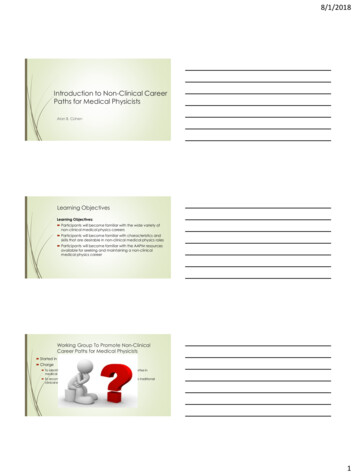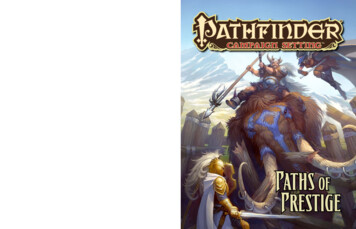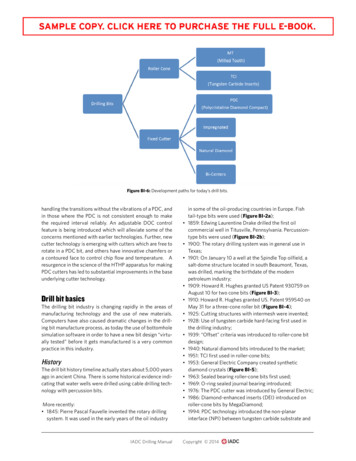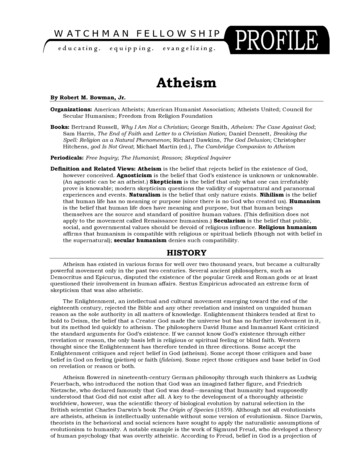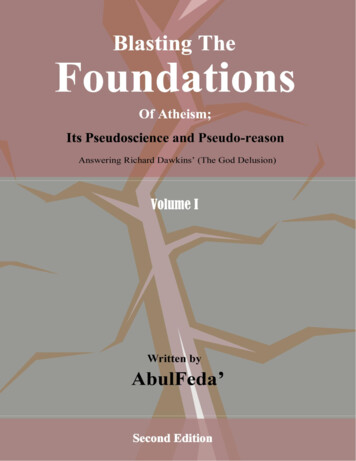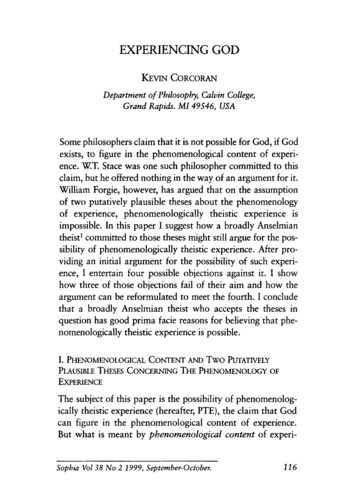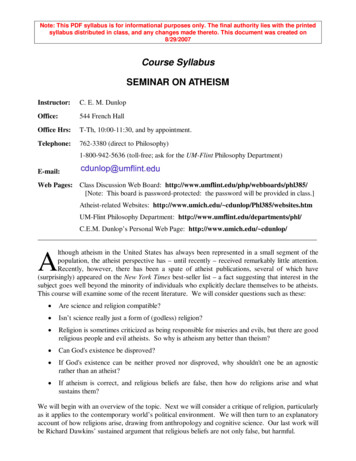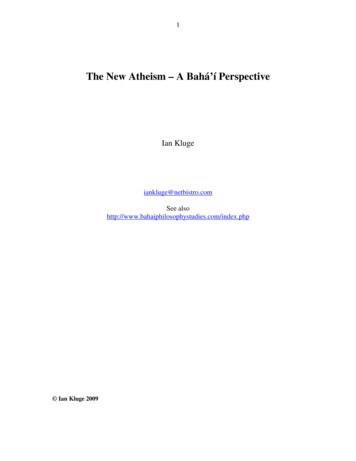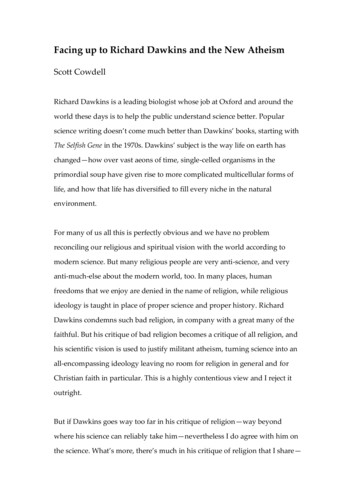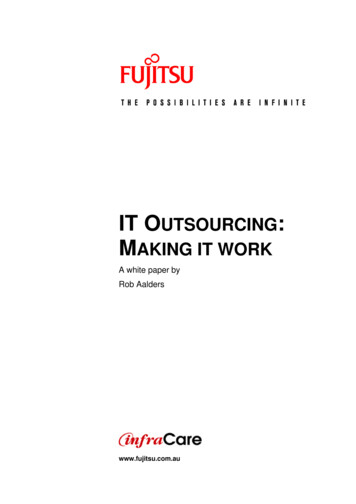
Transcription
ATHEISM – Paths to HumanismA lot of people think that atheism is a recent idea. But religious disbelief actually has a long andfascinating history. Just as a student of Christianity would want to know about a few rathersignificant things that happened 2,000 years ago, someone who wants a better understanding ofatheism likewise needs to know what atheism has been up to for the past 30 centuries or so.Atheism in the distant past and in different culturesPeople tend to think of certain times and places as completely uniform in their beliefs. India isfull to the brim with Hindus. The Greeks all worshipped the gods of Olympus. Everyone inMedieval Europe was Christian. Right?A closer look shows all of these claims to be misleading. Just as political “red states”(Republicans) and “blue states” (Democrats) in the United States are really all various shades ofpurple, every place and time in human history includes a lot of different beliefs — includingatheism.That’s not to say all points of view have the same chance to speak into the cultural microphone.Religion in general and the majority religion in particular tend to call the shots and write thehistories, especially prior to the late 18th century.Add to that the fact that atheism has often been punishable by imprisonment or death, and youcan see why atheists in certain times and places tend to whisper.But the voices are there, including some in the distant past and in cultures both in and out ofEurope. The thread of atheism in the ancient and medieval world is a story that very few peopleknow. Even atheists are usually in the dark about this part of their history.Atheism and the EnlightenmentBy the early 18th century, disbelief was gathering serious steam in Europe. Secret documentschallenging religious belief had been circulating for 50 years, just steps ahead of the censors.French parishioners going through the papers of their Catholic priest who died in 1729 foundcopies of a book, written by the priest for them, telling how much he detested and disbelievedthe religion he’d taught them for 40 years.By the end of the century, philosophers in France, Germany, and England were openlychallenging religious power and ideas and establishing modern concepts of human rights andindividual liberty.It all culminated, for better and worse, in the French Revolution, when a brief flirtation with anatheist state was followed by the Cult of the Supreme Being and the Reign of Terror – at whichpoint atheism went back underground for a bit.1
Atheism in the 19th centuryThe idea that God didn’t really exist never completely went away, even when someone likeNapoleon shut it down for a while. It was always bubbling under the surface and occasionallyshooting out sideways through someone who just couldn’t stand to keep it quiet.The poet Percy Shelley proved to be one such person, getting himself kicked out of Oxford in1811 for expressing an atheist opinion. Then the early feminists of England and the UnitedStates made it plenty clear that they considered religion to be a stumbling block in the way ofwomen’s rights.Science really put the wind in the sails of atheism in the 19th century. By paying close attentionto the natural world, Darwin turned himself from a minister in training to an agnostic andsolved the complexity problem that prevented so many people from letting go of God.As the biologist Richard Dawkins once said, atheism might have been possible before Darwin,but Darwin made it possible to be an “intellectually fulfilled atheist.” But a flurry of activityafter Darwin’s death tried to hide his loss of faith, including some selective slicing and dicing ofhis autobiography and a false deathbed conversion story dreamed up by a British evangelistwith little respect for the Ninth Commandment.In Darwin’s wake, a golden age of freethought opened up in the United States and the UnitedKingdom.Atheism in the 20th centuryAtheism also doesn’t guarantee good behavior any more than religion does, and “Absolutepower corrupts absolutely” becomes a tragically apt phrase in the 20th century.There are plenty of examples of corruption and immorality in positions of unchecked power,both by atheists (such as Mao Zedong in China, Joseph Stalin in the USSR, and Pol Pot inCambodia) and theists (such as Adolf Hitler in Germany, Francisco Franco in Spain, and IdiAmin in Uganda).But there’s also good news, including the growth of humanism as a movement and courtvictories for the separation of church and state – something that benefits both the church and thestate.The 20th century also saw one of the most fascinating developments in the history of religion astwo God-optional religions formed and flourished: Unitarian Universalism and HumanisticJudaism.Reproduced with the permission of author Dale McGowan from his work, The History ofAtheism. McGowan is Executive Director of the Foundation Beyond Belief and the Director ofEthical Education for the American Ethical Union.2
Humanism: A Brief OverviewOur definition. Humanism is a progressive philosophy of life that, without theism and othersupernatural beliefs, affirms our ability and responsibility to lead ethical lives of personalfulfillment that aspire to the greater good of humanity.The mission of the American Humanist Association is to advance humanism, an ethical andlife-affirming philosophy free of belief in any gods and other supernatural forces. Advocatingfor equality for nontheists and a society guided by reason, empathy, and our growingknowledge of the world, the AHA promotes a worldview that encourages individuals to liveinformed and meaningful lives that aspire to the greater good.Key issues. The AHA strives to bring about a progressive society where being good without agod is an accepted way to live life. We accomplish this through our defense of civil liberties andsecular governance, by our outreach to the growing number of people without religious belief orpreference, and through a continued refinement and advancement of the humanist worldview.The primary issues include Secular Government, Scientific Integrity, Human Rights for All,Promoting Peace, Reproductive Freedom, Women's Rights, LGBTQ Rights, and Civil Rights inAmerica.Key facts. The AHA currently has 30,000 members and is growing constantly. More than twothirds of people who identify as humanists and who are members of the American HumanistAssociation also identify as atheists.Get to know us better. One way is to explore the many resources of the AHA in our website at:http://americanhumanist.org/Humanism. The topics include: Explanations of Humanism:Humanism and Its Aspirations; What is Humanism?; The Humanist Philosophy in Perspective;and Quotations from Famous Humanists; Humanist Essays on Living the Humanist Life,Humanism and Traditional Religion, The History of Humanism, Philosophical Questions, Ideasfor Advancing Humanism, and local group Discussions on Humanism (Video presentations andonline media from our local groups).For additional information and for answers to any questions you might have about the humanistworldview and lifestance, please contact us at: aha@americanhumanist.orgConsider joining the American Humanist Association -- now that you are getting to know us.An atheist and humanist conversationA group of current and historical atheists and humanists communicate the often intertwinednature of humanism and atheism clearly.“I have something to say (about atheists) to the religionist who feels atheists never say anythingpositive: You are an intelligent human being. Your life is valuable for its own sake. You arenot second-class in the universe, deriving meaning and purpose from some other mind. You are3
not inherently evil -- you are inherently human, possessing the positive rational potential to helpmake this world of morality, peace and joy. Trust yourself” -- Dan Barker is the co-president ofthe Freedom From Religion Foundation.“I have known many good people who did not believe in God. But I have never known ahuman being who was good who did not believe in people.” -- John Lovejoy Elliott was anEthical Culture Leader at the New York Society for Ethical Culture.“There doesn’t need to be a god for me. There’s something in people that’s spiritual, that’sgodlike.” – Angelina Jolie, actor.“What I'm asking you to entertain is that there is nothing we need to believe on insufficientevidence in order to have deeply ethical and spiritual lives.” -- Sam Harris, an Americanauthor, philosopher, and neuroscientist, is the co-founder and chief executive of Project Reason.He is the author of The End of Faith and Letter to a Christian Nation.“I’m an atheist and that’s it. I believe there’s nothing we can know except that we should bekind to each other and do what we can for other people.” -- Katharine Hepburn, actor.“It is quite possible to be an atheist and be quite deluded about other things other than religion.‘A-theism’ is an empty category. ‘Humanism’ may be deluded about human potential, but atleast it is a hopeful and non-exclusionary delusion!” – Joyce Carol Oates AHA Humanist of theYear and prolific author.“Atheism is more than just the knowledge that gods do not exist, and that religion is either amistake or a fraud. Atheism is an attitude, a frame of mind that looks at the world objectively,fearlessly, always trying to understand all things as a part of nature.” -- Carl Sagan was anAmerican astronomer, cosmologist, astrophysicist, astrobiologist, author, and sciencepopularize. In 1981 he received the AHA’s Humanist of the Year award.“Humanism is the only -- I would go so far as saying the final -- resistance we have against theinhuman practices and injustices that disfigure human history.” -- Edward W. Said was aUniversity Professor of English and Comparative Literature at Columbia University.“My atheism, like that of Spinoza, is true piety towards the universe and denies only godsfashioned by men in their own image, to be servants of their human interests.”-- George Santayana was a philosopher, essayist, poet, and novelist."We are talking about a society in which there will be no roles other than those chosen, orearned. We are really talking about humanism.” – Gloria Steinem, feminist and author.“Faith in God necessarily implies a lack of faith in humanity.” -- Barbara G. Walker is theauthor of Man Made God and The Woman’s Encyclopedia of Myths and Secrets.4
“Faith in God means believing absolutely in something with no proof whatsoever. Faith inhumanity means believing absolutely in something with a huge amount of proof to the contrary.We are the true believers.” -- Joss Whedon is an American screenwriter, film and televisiondirector and producer, composer and actor.“I believe in God, only I spell it Nature.” -- Frank Lloyd Wright was an American architect,interior designer, writer, and educator.Herb Silverman, a member of the AHA Board of Directors and author of Candidate without aPrayer: An Autobiography of a Jewish Atheist in the Bible Belt has listed “Ten Things I wisheveryone knew about atheism.”1. The prefix “a” can mean “anti” or “non.” While some atheists are anti-theists, most arenon-theists who have no desire to destroy religion. We don’t have a problem with believersuntil they try to force their beliefs on others.2. Atheists are not necessarily protesters, though that’s how they are usually portrayed in themedia. When they do protest, they protest government privileging of one religion over anotheror religion over non-religion.3. Atheists are not angry at God (just as they are not angry at the Tooth Fairy), and mostof us didn’t become atheists because something bad happened to us. We became atheistsbecause we find no evidence for any gods.4. Atheists are not less trustworthy just because we don’t believe in a judging God.Believing that of us only makes us think you would be untrustworthy were it not for your fearof God.5. We can find joy without belief in God and an afterlife. We may not see any cosmicpurpose of life, but we do find our own joyful purposes in life.6. Most religious people are secular most of the time. Ask yourself how you would behavedifferently if you stopped believing in God. If you can’t come up with a good answer, then youare what I call a functional atheist.7. Calling atheism a religion is like calling baldness a hair color. The “religion” of atheismand secular humanism is not taught in public schools, unless you think that conveying the bestavailable scientific information is a religious act. If you wind up abandoning faith insupernatural things because of science, as many do, that is a collateral benefit to criticalthinking.8. Most atheists don’t go around proselytizing or promoting atheism. For every open atheistyou know, there are probably dozens of non-identifying atheists whom you assume are5
religious. Many are afraid to come out of their atheist closets, and the varied reasons for thatwould require another list of ten or more things that I wish everyone would know.9. Atheists don’t fit your stereotypes. There are good and bad atheists just as there are goodand bad Christians, Jews, Muslims, men, women, and any other category. Judge people by theiractions and the content of their character, not by their professed religious beliefs.10. Most of the atheists I know have a good sense of humor, so I’ll end with a joke:A Jewish atheist hears that the best school in town happens to be Catholic, so he enrolls his son.Things are going well until one day the boy comes home and says, “I just learned all about theFather, the Son, and the Holy Ghost.” The boy’s father is barely able to control his rage. Hegrabs his son by the shoulders and says, “Joey, this is very important, so listen carefully. Thereis only ONE God — and we don’t believe in Him!”Source: usion: We atheists and humanists are on the common ground of nature. We are naturalistsin that we share the idea that only natural (as opposed to supernatural) laws and forces operatein the world.Alain de Botton, a Swiss philosopher, has written “A Manifesto for Atheists: The Virtues forthe Modern Age.” His 10 commandments for atheists are:1. Resilience. Keeping going even when things are looking dark.2. Empathy. The capacity to connect imaginatively with the sufferings and unique experiencesof another person.3. Patience. We should grow calmer and more forgiving by getting more realistic about howthings actually tend to go.4. Sacrifice. We won't ever manage to raise a family, love someone else or save the planet if wedon't keep up with the art of sacrifice.5. Politeness. Politeness is very linked to tolerance, the capacity to live alongside people whomone will never agree with, but at the same time, can't avoid.6. Humour. Like anger, humour springs from disappointment, but it's disappointment optimallychannelled.7. Self-Awareness. To know oneself is to try not to blame others for one's troubles and moods;to have a sense of what's going on inside oneself, and what actually belongs to the world.8. Forgiveness. It's recognising that living with others isn't possible without excusing errors.9. Hope. Pessimism isn't necessarily deep, nor optimism shallow.10. Confidence. Confidence isn’t arrogance, it’s based on a constant awareness of how short lifeis and how little we ultimately lose from risking everything.-- https://www.the e-Modern-Age.pdfSounds a lot like humanism, doesn’t it?6
Recommended readingsNonbeliever Nation: The Rise of Secular Americans by David Niose; Palgrave MacmillanTrade, 2013 (December 17, 2013). -- David Niose, director of the Appignani Humanist LegalCenter and recent president of the Secular Coalition for America. From a review by DavidChivers: Niose’s book, “outlines the history of secular thought in America, the relatively recentrise of the Religious Right, and a resulting re-emergence of secular forces that is still in its earlystages. He then urges secular people (whom he broadly defines) to step forward and reclaimtheir longstanding right to be recognized and allowed to participate in the political life of theUnited States. Niose’s book is a clear, well-written, thoughtful summation of the secularistviewpoint, written in an engaging, lively style. This should make it an appealing introduction tohumanist/secularist thought for those who are not humanists, and for humanists it provides awonderful summation of our general viewpoint.Creating Change Through Humanism by Roy Speckhardt, Humanist Press, Washington, D.C.,2015. ---Speckhardt is the executive director of the American Humanist Association. In thisbook he explores the key underpinnings of humanism thought, connects the dots towardpolitical issue activism for humanists and calls people to action in order to make this world abetter place.Humanism for Parents: Parenting Without Religion by Sean P. Curley; Lulu.com, 2007. –SeanCurley is frequently found speaking on diverse topics such as humanism, management,parenting, and religious history. Curley provides practical information for any caregiver whodoes not or cannot use religion as the basis for raising or teaching a child. As he has noted,“Regardless of religious affiliation, many parents today do not rely on religious teachings orhistory for parenting. However, religions have a rich history of rites, rituals, and practices thataid in the healthy development of children and that can be lacking in a non-religious homeenvironment. This books details these rites, rituals, and practices and gives alternatives tomodern parents who want to raise healthy, spiritually fulfilled children without reliance onreligion.”Man Made God by Barbara G. Walker; Stellar House Publishing, Seattle, Washington, 2010.Barbara G. Walker takes readers “back in time when the Goddess and her consort/son ruledsupreme, into the era when the patriarchy usurped Her worship, right up to Barbara’s ownpersonal experience being raised a Christian.” The series of articles include a wide array oftopics including Religion as big business, Religion's effects on children, Biblical fallibility,Church doctrine regarding women, and Traditional Christian origins. “A frank and exceptionalanalysis, this powerful book Man Made God unveils mysteries that have perplexed mankind formillennia, and unravels detrimental religious ideologies that have been plaguing humanity forequally long.”There is another book which we are highlighting in particular detail: Atheist Mind, HumanistHeart: Rewriting the Ten Commandments for the Twenty-first Century by Lex Bayer and John7
Figdor; Rowman & Littlefield Publishers, October 2014. Lex Bayer serves as a board memberof the Humanist Connection, a humanist, atheist, and agnostic nonprofit organization servingStanford University and Silicon Valley. John Figdor is the humanist chaplain at Stanford wherehe organizes programs for both students and community members in the San Francisco Bayarea. Previously he served as assistant humanist chaplain at Harvard.Atheist Mind, Humanist Heart asks an essential question for the 45 million Americans who selfidentify as nonreligious: “So, you don’t believe in God; now what?” This question isincreasingly important in that it is estimated that one-third of young adults under the age ofthirty in his country consider themselves non-religious.This book illustrates that atheism not only rejects the God concept but, as importantly,suggests a set of humanist-oriented principles by which to live. It encourages and guidesreaders through the process of formulating their own set of personal beliefs, namely, how tolive a reasonable, ethical, and happy life without God. The authors state, loud and clear, that“skepticism, rigorous logic, compassionate ethics, personal integrity, and morals may well becharacteristics of atheist minds and humanist hearts.”Check the book’s website (www.AthiestMindHumanistHeart.com/) which includes onlinetools, opportunities to “share your beliefs”, and a sample chapter of the book. RebeccaNewberger Goldstein, novelist, philosopher and American Humanist Association 2011Humanist of the Year endorsed the book stating “The promise of this wonderfully entitledbook is fully realized in its pages, which speak with both intellectual integrity and heartfeltcare for humanity.”What is the Next Step?In addition to reading we also suggest that you begin to dialogue with American HumanistAssociation members in your community on the mission of the AHA and the key issues notedabove. Explore our website (americanhumanist.org/) where you will find a wealth ofinformation about our local groups, programs, publications and resources of all types forpeople of all ages. You can, of course, join the majority of the members and followers of theAmerican Humanist Association who identify both as atheist and humanist and connect with uson Facebook, Twitter and become a member. We welcome you!Are you a humanist perhaps without realizing it? If you agree with the following positionscited in Lloyd and Mary Morain’s Humanism As The Next Step, you are a humanist as well asan atheist:-- Humans are, in every respect, a part of nature. They are a natural product of evolutionaryprocesses.-- We humans, like all other living things, must rely upon ourselves, upon one another, andupon nature. There is no evidence that we receive support or guidance from any immaterialpower with whom we might imagine we commune.8
--We are able to meet the challenges of life in constantly more satisfying ways provided we areable to make fuller use of our capacities.-- The meaning of life is that which we give to it. Happiness and self-fulfillment for oneselfand others are richly sufficient life goals.-- Moral codes are made by humans. Values and ideals grow out of the experience of variouscultures, societies, and individuals.-- The supreme value is the individual human being. Each person, of whatever race orcondition, merits equal concern and opportunity.A final wordWe conclude by repeating the statement by Roy Speckhardt, AHA Executive Director, inAtheist, Humanist, Secular: Why Fight Over Labels:By definition, identifying as atheist indicates that one doesn’t have a belief system thatincludes a god, nothing more. It doesn't encompass all the views that a person has when itcomes to personal values, which is why terms like “humanist” and “secular Jew” are soimportant. Nonreligious Jews might not believe in a god, but they may base their ethics orculture on elements of Judaism that they find to be meaningful. The same goes for humanistswho find that a simple negation of belief in a deity is not enough to live life ethically and fully,and that the progressive values of humanism complement their skepticism.9
As the biologist Richard Dawkins once said, atheism might have been possible before Darwin, but Darwin made it possible to be an “intellectually fulfilled atheist.” But a flurry of activity after Darwin’s death tried to hide his loss
